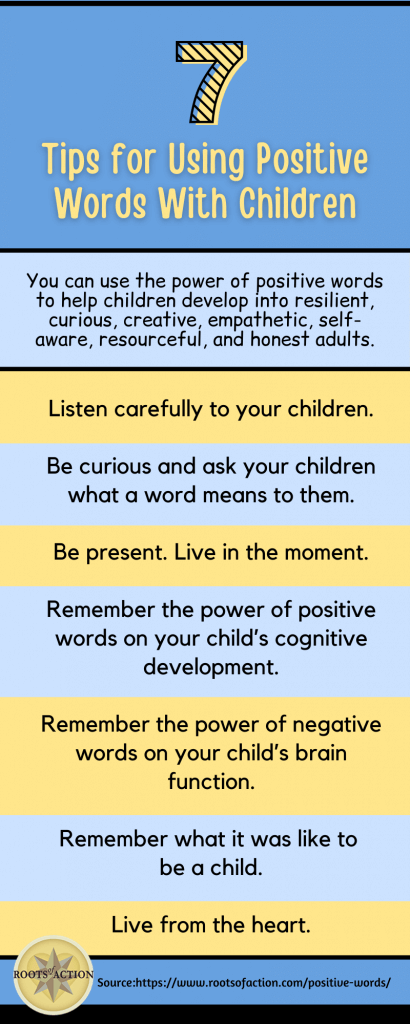
Positive words are not always easy for parents to speak, especially during moments when they wish their child were behaving differently. Yet the power of positive words from a supportive parent is undeniable.
During these unprecedented times, the importance of raising resilient children is more important than ever. Research at the Center on the Developing Child at Harvard University suggests that the single most common factor for developing resilience is the presence of at least one supportive adult in a child’s life.
Are you that adult in your child’s life? Do your positive words outweigh your negative ones?
While perfection as a parent is an unattainable goal, the words and tone parents use can tremendously influence a children’s sense of self. As a newly minted therapist and father of three beautifully imperfect adult children, I had been reflecting about the power of positive words on a recent walk through a park near my home and how my words may have impacted my children.
When Words Bring About Shame
My peaceful reflection was abruptly interrupted by a young father impatiently gesturing to his three-year-old son to move behind a small boulder at the park’s entrance. The little boy looked anxious; he needed to pee.
As I walked by the two of them, the father said to me, “I don’t know why he has to pull his pants down to do that.”
Immediately, I felt empathy for the boy. Did he feel ashamed that he could not pee like an older boy?
Were the father’s actions and words conscious or unconscious? Does it matter?
What matters is whether the father’s spoken words caused his son to feel shame or unsafe. Most troubling is that these feelings can lead to attachment issues between father and son—a break in the emotional bond that is at the foundation of a parent-child relationship.
Positive Words are Uplifting
Shortly after witnessing the interaction between the father and son, I walked further and noticed a mother and her young son.
Enjoying the benefits of nature, mother and son were happily walking onto a dock with fishing poles in hand, chatting with one another. I asked the little boy if he caught anything. The mother jumped in using positive words and tone: “Oh, we are not catching today we are just fishing. And my son cast four times!”
The little boy’s face lit up, and he was beaming with pride. He seemed to feel secure, protected, and praised for his actions.
I do not know which little boy has a healthier family life. I certainly do not know which little boy will grow up more secure. But I do know that one little boy was elevated, and one little boy was deflated because of the words and tone of their parents.
Next time you interact with your child, notice if your positive words uplift him. Notice if your judgmental words cause her shame or discomfort.
Psychologist John Bowlby wrote, “Humans have an innate tendency to make strong affectional bonds (attachments), and that separation or threat of separation of these bonds causes emotional distress, sadness, and in some cases, severe depression.”
As I reflect on my role as a father, I cannot help but think there were many moments when my words negatively impacted my children. If I knew then what I know now, I would have slowed down and thought more carefully about the impact of my tone and words on my children.
The Psychological Benefits of Hope
Hope is one of my favorite words because of the positive impact it has on children.
In the Handbook of Positive Psychology, Martin E. P. Seligman wrote, “We have discovered that there are human strengths that act as buffers against mental illness.” Hope is one of them.
Think about the word hope and how children behave when they have hope. Most importantly, how do they react to positive words of hope?
According to Andrew Newberg, M.D. and Mark Waldman, the authors of Words Can Change Your Brain, positive words, “can alter the expression of genes, strengthening areas in our frontal lobes and promoting the brain’s cognitive functioning.”
Research on the impact of positive words is impressive. By using more positive words in the home, parents can support the development of their child’s healthy brain.
Conversely, compare the effects of encouraging words for kids to negative words like ‘dumb.’ How do you feel when another human being calls you dumb? How do you think it feels for a child?
Newberg and Waldman also concluded, “A single negative word can increase the activity in our amygdala (the fear center of the brain). This releases dozens of stress-producing hormones and neurotransmitters, which in turn interrupts our brains’ functioning.”
Through positive words, parents can promote children’s cognitive functioning. With negative words, a child’s brain functioning can be interrupted.
Yes. Words have power.

Words Have Different Meanings to Different People
Positive words to some people can be interpreted negatively by others.
A good example of this phenomenon is found in John Lennon’s song Imagine. It is reported that Lennon was asking his audience to imagine a place where the things that divide us, like religion and possessions, did not exist. To some, this is a beautiful song with powerful, positive words.
To others, this song may be offensive because it imagines a world without religion, without heaven, without possessions.
Children often attribute different meaning to words than adults. As parents seek to develop a loving, supportive relationship with a child, check often for how a child interprets your words. If you notice a negative shift in a child’s body language or mood when you thought you were offering positive words of encouragement, confirm that your words were heard as you intended them.
7 Tips for Using Positive Words with Children
How do you use the power of positive words to help your children develop into resilient, curious, creative, empathetic, self-aware, resourceful, and honest adults? Here are a few tips:
- Listen carefully to your children.
- Be curious and ask your children what a word means to them.
- Be present. Live in the moment.
- Remember the power of positive words on your child’s cognitive development.
- Remember the power of negative words on your child’s brain function.
- Remember what it was like to be a child.
- Live from the heart.
Finally, it is important to acknowledge that the power of positive words applies to adults as well. Parents owe it to themselves to work with their internal voices that often hear the negative more than the positive. Finding pathways to hearing and using positive words increases an entire family’s well-being.
Infographic to Use and Share
Please feel free to download, copy, and share the following infographic outlining this article’s 7 tips for using positive words with children.

Related Articles You May Enjoy
Encouraging Words for Kids That Ignite Self-Discovery and Growth
Negativity and Your Child’s Brain: How to Help Kids Stay Positive
Published: August 31, 2020



